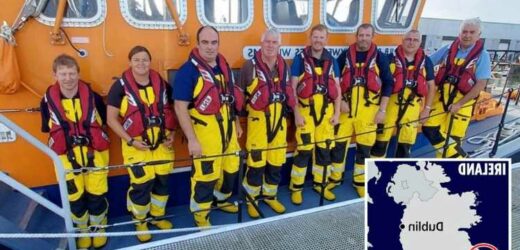A SWIMMER was rescued after a gruelling 12 hours at sea in nothing but a pair of swimming trunks – helped by dolphins who surrounded him.
The man was hauled out of the freezing water in a "miracle" rescue by the RNLI, aided by a pod of dolphins who lifeboat crew believed "helped him".
The swimmer, in his 30s, was stranded two and a half miles off shore in the icy waters of Tralee Bay, Ireland on Sunday.
The hypothermic and exhausted man from Derry, Ireland, said he had attempted to swim more than five miles off the coast of Castlegregory beach in southwest Ireland to Mucklaghmore Rock, but he was sorely unprepared.
He was found more than 12 hours after he had set off, wearing nothing but a pair of skimpy swimming trunks and surrounded by dolphins, thanks to RNLI coxswain Finbarr O'Connell's excellent knowledge of the bay's tides and currents.
Fenit RNLI volunteer Jackie Murphy said it was a 'miracle' the man had survived the ordeal, and credited O'Connell with his rescue thanks to his ability to calculate the swimmer's likely position.
Do you know the swimmer? Contact Adriana at [email protected]
The man's salvation came after crews from Fenit RNLI and R118 coastguard conducted an intensive search and rescue operation across Tralee Bay, according to the Irish Independent.
A Facebook post by Fenit Lifeboat Station said the Irish coastguard requested a rescue mission as early as 11am after the swimmer's clothes were discovered on the beach.
The search operation was called off after several hours in the afternoon, but was reactivated at 6pm as lifeboats were joined by helicopters to aid the search.
Fenit RNLI said the crew spotted "a pod of dolphins about two and a half miles off Castlegregory beach", which led them to discover the desperate swimmer.
The crew pulled the man, who was incredibly still conscious, from the water and ferried him back to shore, where he was met by an ambulance and promptly transported to hospital.
RNLI coxswain O'Connell said: 'He was very, very lucky. There is no doubt about it. Another half an hour, and he was a goner.
"It is literally beyond us all (how he survived), he had no wetsuit, nothing.
"His body temperature was so low. It dropped way down. The medics were amazed with him. It's incredible, really."
Coxswain O'Connell also made a point of noting the dolphins who had reportedly circled the swimmer but were not acting aggressively, perhaps in an effort to protect him or herd him back to safety.
'There were a lot of dolphins around, maybe they helped him in some way or another – who knows?"
Rescuers who first saw the man when they arrived at the scene thought they had spotted a seal drifting in the water, but the hypothermic and fatigued swimmer managed to raise an arm to signal for help.
"It was a great, great moment for us," said O'Connell.
"The elation of seeing somebody floating alive in the water, rather than the other way, is so great.
"We have had too many bad outcomes, so it was absolutely fantastic to pick him up."
"Normally we go out, and it mightn't be that positive. We are all just elated."
Fenit RNLI lifeboat operations manager Gerard O'Donnell echoed coxswain O'Connell's statements of elation at finding and saving the swimmer, but warned of the dangers of swimming in the sea.
"Even at this time of year, the water can be very cold. When the lifeboat crew found [the swimmer] they were a good distance from the shore and were exhausted."
O'Donnell advised anyone going for a swim to take all necessary precautions and to let people know where they are going and when they are expected back to avoid being stranded for long periods of time.
Water Safety Ireland is urging people going to the beach or paddling in the sea to swim within their depth following the incident.
"Many people are swimming for the first time this year and have not had swimming classes for more than 15 months.
"Swim at a lifeguarded waterway. Otherwise swimming areas that are known locally as safe and where there are ring-buoys present for rescues.
"Make sure that the water's edge is shallow shelving so that you can safely enter and exit."
Source: Read Full Article




